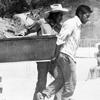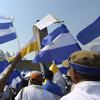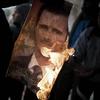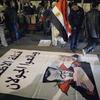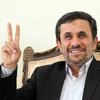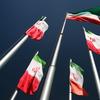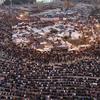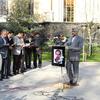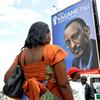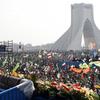Stephen Kinzer appears in the following:
The Shameful History of US Intervention in Latin America
Friday, February 01, 2019
Mass Protests Undermine Authority of Nicaraguan President
Monday, April 30, 2018
A Shaky Truce for a Fragile Syria
Monday, February 29, 2016
How Brothers John Foster Dulles and Allen Dulles Shaped the World
Tuesday, February 04, 2014
At the peak of the Cold War in the 1950s, two powerful brothers—Secretary of State John Foster Dulles and CIA director Allen Dulles —led the United States into a series of foreign conflicts whose effects are still felt around the world today. Historian Stephen Kinzer explains how they were both propelled by what he calls a quintessentially American set of fears and delusions. In The Brothers: John Foster Dulles, Allen Dulles, and Their Secret World War, Kinzer, looks at their campaigns that pushed countries from Guatemala to the Congo into long spirals of violence, led the United States into the Vietnam War, and laid the foundation for decades of hostility between the United States and other countries.
John Kerry Begins Work as Secretary of State, Facing Iran, Drone War
Monday, February 04, 2013
Syrian Violence Continues After Peace Plan Deadline
Wednesday, April 11, 2012
Iran: Hope for Diplomacy?
Thursday, February 16, 2012
On Wednesday, Iran claimed to have made advances in the master production of nuclear fuel despite increasingly tough sanctions by the West over its controversial nuclear program. This week Iran has also been in the headlines for a series of attacks in Thailand, India and Georgia. Furthermore, relations between Israel and Iran are increasingly strained with threats of aggression coming from both sides. Is there still hope for diplomacy between Iran and Western governments?
Foiled Plot Reveals an Unstable Iran
Wednesday, October 12, 2011
Attorney General Eric Holder announced in a news conference on Tuesday that U.S. officials foiled an Iranian-backed terrorist plot to assassinate the Saudi Arabian ambassador to Washington. The plot, which allegedly involved a Mexican cartel and large sums of money, would have culminated in an assassination on U.S. soil — a clear violation of international law. But perhaps more tellingly, this plot reveals major rifts between two of the Middle East's largest nations and within Iran's highest levels of power.
After Egypt, Protests Ripple Throughout the Region
Monday, February 14, 2011
A ripple of activism is spreading across the Middle East, following Egypt’s popular uprising that ended three decades of authoritarian rule. Iran’s opposition rallied in Tehran despite a government ban, and the Palestinian cabinet resigned Monday. What does this change mean for the United States' role in the Mideast? William Yong, reporter for The New York Times is in Tehran, where he's been watching the protests.
A democratic ripple is spreading across the Middle East, following Egypt’s transition from three decades of authoritarian rule.
Overnight, Iran’s opposition rallied in Tehran despite a government ban, while there are reports that the Palestinian cabinet will resign, following protests.
The popular uprisings could transcend regional borders, and spur democratic change in others parts of the world, such as Latin America.
Where America Stands on Democracy in the Middle East
Tuesday, February 01, 2011
The United States is performing a difficult balancing act in how to respond to the tumult in Egypt. The Obama administration was quick to show support for protesters who are pushing for democratic reform in the Middle East, but hasn't forcefully called for the end to Mubarak's regime.
Iran Pursues Nuclear Ambitions, Produces Yellowcake Uranium
Monday, December 06, 2010
American and European diplomats are meeting in Geneva today in hopes of building a framework for future talks on tempering Iran’s nuclear ambitions. But yesterday, Iran's Atomic Energy Organization announced that it had produced yellowcake uranium from domestically-mined ore — a breakthrough that eliminates Iran's reliance on imports for their nuclear goals.
Kagame Expects Resounding Victory in Rwanda's Presidential Election
Monday, August 09, 2010
On Monday, Rwandans head to the polls to vote in presidential elections. Incumbent President Paul Kagame is expected to win by a landslide. Kagame is credited with bringing stability, development and economic prosperity to Rwanda following the 1994 genocide. While few expect violence on election day, Amnesty International says voters are casting their ballots in a climate of fear.
Iran: An Uprising, A Crackdown. One Year Later, Where's The Revolutionary Spirit?
Friday, June 11, 2010
One year ago, Iran, in turmoil, appeared to be on the brink of a revolution. Mahmoud Ahmedinejad was declared the winner of Iran's much-contested presidential election. For days afterwards, protests raged. Hundreds of thousands of Iranians poured into the streets. They marched, despite a savage government crackdown. Dissidents, journalists and ordinary people were swept off the streets and imprisoned, but the protests went on. Cameras filmed the death throes of a young woman, Neda Agha-Soltan, shot in the streets of Tehran. She was called a martyr; her death fuelled even more protests. Twitter and Youtube became foreign correspondents, telling stories from the embattled nation after traditional media were shut down or shut out. But the protests petered out.
One year later, where is the revolutionary fervor?
Reset
Thursday, June 10, 2010
Stephen Kinzer explains what he thinks the United States can do to help realize its dream of a peaceful, democratic Middle East.
Protests in Iran Mark 31 Years Since Revolution
Thursday, February 11, 2010
Today is the 31st anniversary of the Iranian revolution, and to mark that date, Iranians took to the streets in protest this morning. For a look at the challenges - both internal and external - that Iran is facing, we're joined by Stephen Kinzer, author of "All The Shah's Men: An American Coup and the Roots of Middle East Terror" and a forthcoming book"Reset: Itan, Turkey and America's future."
